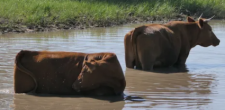Beef cattle experts talk benefits, drawbacks of giving cattle access to ponds
MANHATTAN, Kan. — On a hot summer’s day, there is nothing like a cool dip in the pond to leave a person refreshed. Not only do people enjoy a swim, cattle do too, said veterinarians at the Kansas State University Beef Cattle Institute
On a recent Cattle Chat podcast, they discussed the pros and cons of granting cattle access to ponds in the summer.
If producers have limited water sources in a pasture, a pond can meet that need, said the veterinarians. However, they also said the water sources need to be monitored.
“Watering ponds need to be checked to make sure that the water is clean and not full of waste and sediment,” veterinarian Bob Larson said. “In some situations, you may want to consider fencing off the pond.”
One reason producers opt to fence off the pond is to keep the bank from eroding, said veterinarian Brad White.
“If part of the shoreline is eroding, then producers can just fence out that area while still giving cattle access to the water,” White said.
Veterinarian Brian Lubbers said it is also important to note the amount of time the cows spend in the water. He said that dairy cattle spending significant time in cooling ponds can develop mastitis.
“However, there are some physiological differences in teat confirmation between dairy and beef cows that put beef cattle at a lower risk for those complications developing as a result of their time in the pond,” Lubbers said.
Another condition that cattle in ponds sometimes experience is foot rot, Larson said. He explained that is an easily treated infection of the hoof.
Lubbers added: “Overall the risk of health challenges for beef cattle in ponds is low and when considering investments in the herd, fencing off the pond is a low priority on my list of recommendations for producers.”
To hear more on this topic, listen to the Cattle Chat podcast online.
-30-
FOR PRINT PUBLICATIONS: Links used in this story
BCI Cattle Chat podcast, https://ksubci.org/2021/08/20/pond-management-invest-in-your-herd-reducing-shrinkage-weaning-and-cow-health/
K State Research and Extension is a short name for the Kansas State University Agricultural Experiment Station and Cooperative Extension Service, a program designed to generate and distribute useful knowledge for the well being of Kansans. Supported by county, state, federal and private funds, the program has county extension offices, experiment fields, area extension offices and regional research centers statewide. Its headquarters is on the K State campus in Manhattan. For more information, visit www.ksre.ksu.edu. K-State Research and Extension is an equal opportunity provider and employer.
Story by:
Lisa Moser
785-532-2010
lmoser@ksu.edu
More information:
Bob Larson
785-532-4257
rlarson@vet.k-state.edu
Brian Lubbers
785-532-4012
blubbers@vet.k-state.edu
Brad White
785-532-4243
bwhite@vet.k-state.edu



